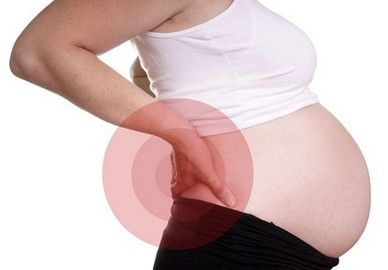Sprain Pain During Pregnancy

Contents:
- Sometimes I Have Abdominal Pains, it is ok?
- Is Ligament Sprain a Reason to See a Doctor?
- How to Relieve Abdominal Pains?
- Can the Ligament Pain be Caused by any Other Reasons?
Sometimes I Have Abdominal Pains, it is ok?
Pain in the lower abdomen is quite normal. It can be a short sharp stabbing or long nagging pain in the abdomen or groin. Such pain, unlike spasms, is caused by stretching of the muscles and ligaments (dense and elastic tissues that connect bones) that support the uterus. The uterus is growing, and ligaments stretch and thicken in order to support it. These changes may provoke pains on one or both sides of the abdomen.
The pain may start in the groin, extending upward, to the external sides of the thighs. Pain is inside, but if you want to define its localization, it would be your bikini line. Starting from the second trimester, you may feel the acute pain when changing the position of your body, for example, when you get up from the bed or chair, when you cough or getting out of the bathtub. You may feel dull pain after an active day, a long walk or other physical activity.
Stretching can disturb you, when in late pregnancy your baby’s head descends into the pelvis. During your second or subsequent pregnancies, the ligament sprain may sometimes be more painful than during the first one. Ligament sprain is provoked by changing in hormones during pregnancy.
Is Ligament Sprain a Reason to See a Doctor?

Sharp penetrating pain during ligaments lasts no more than a few seconds, while you are changing the position of your body or getting up.
Consult your doctor if the abdominal pain resumes after small breaks or if it is accompanied by:
- Sharp pains or cramps, as well as contractions, repeating more often than four times an hour (even if the contractions are painless).
- Back pain, especially if you've not encountered or high pressure in the pelvis (feeling that the baby presses on the pelvis).
- Bleeding, bloody droppings or changing nature of vaginal discharge.
- Fever, chills, weakness, nausea or vomiting.
- Pain or burning sensation when urinating.
How to Relieve Abdominal Pains?
You need to sit down and relax. Peaceful rest should relieve these symptoms. If you don’t feel relief when seated, try to stand on all four or lean forward through the back of the couch. Get up from sitting or lying down slowly. It can help because your muscles get additional time to adjust and hold the body, when you are changing its position. You can also try shifting your pelvis a little bit backward when getting up.
You can bend your knees and push them to your abdomen or lie down on one side, placing one pillow under the belly, and another one between your legs. In addition, try to take a warm bath. Sometimes, supporting belt or elastic bandage for the pregnant helps to unweight your abdominal muscles. Your doctor will help you choose the bandage.
If you notice that the pain usually starts when you are especially active, slow down and see if you feel better. Then, if you feel better, gradually increase you activity and determine the acceptable level.
Can the Ligament Pain be Caused by any Other Reasons?
In some cases, lower abdominal pain may indicate a urinary tract infection. It may be accompanied by fever and general unwellness or pain when urinating. Consult your doctor if you have any doubts. The doctor will prescribe you a urine test to detect infection. If you feel pain in the pubic bone, it can be caused by divergence of the pubic symphysis – a state associated with disfunction of pelvic ligaments. If you think this is the cause of your pain, consult your doctor.